Conquest (1983)
Directed by: Lucio Fulci
Written by: Carlos Vasallo, Gino Capone, Giovanni Di Clemente, José Antonio de la Loma
Starring: Andrea Occhipinti, Conrado San Martín, Jorge Rivero, Violeta Cela
Italy
AVAILABLE ON DVD
RUNNING TIME: 90 mins
REVIEWED BY: Dr Lenera, Official HCF Critic
In a mystical prehistoric world, Ilias, armed with a magical bow and arrow, embarks on a quest to rid the world of all evil. He enters a land where small tribes are being terrorised by werewolf-like creatures under the orders of Ocron, a masked female of great evil. After a terrifying hallucination where a faceless youth shoots her with an arrow, she becomes determined to take Ilias’s magic bow, and Ilias isn’t much of a fighter, but luckily wandering barbarian Mace is at hand.…
So after reviewing lots of Lucio Fulci’s horror films plus a couple of his gialli, I decided to take a look at one of the movies he made in a different genre. Conquest was the film that Fulci made immediately following Manhattan Baby [which was the last Fulci effort that I reviewed], and the first in some time not to be produced by Fabrizio de Angelis. While fans are divided in their opinion of Manhattan Baby, most seem to share the opinion that Conquest is a real step down and set the low quality for most of Fulci’s later work. If you’ve been reading this series of reviews, you’ll know that I’d agree that Fulci’s post-de Angelis stuff is disappointing from what I’ve seen, rife with carelessness and even disinterest, even if Aenigma, Touch Of Death and Cat In The Brain still have their moments and points of interest. But for me, Conquest was rather better than I remembered, and can now be seen to have many similarities with Fulci’s surreal horror classics as well as being the closest Fulci came to the look and feel of a Mario Bava film. Considered as yet another one of the many cheapie sword and sorcery flick inspired by Conan The Barbarian, it also joins a small number of films directly influenced by Quest Of Fire which attempted to show the life of early humankind fairly seriously. But none of this really describes the sheer weirdness of this picture, which proceeds in a very dreamlike, random fashion full of ‘WFT’ scenes as its two protagonists wonder through Fulci’s eerie prehistoric world with its forbidding landscapes, foreboding swamps and grotesque creatures, with constantly lurid-coloured skies that add even more to the almost trippy feel. I used to have this on video, but found the picture quality to be so bad that I got rid of it even before I started buying DVDs. Watching it now on DVD, it became apparent that, by the standards of VHS, the video was actually a reasonable approximation of how the film was actually supposed to look, with soft filters and fog constantly blurring the image in a way that I’m sure really puts off a lot of viewers.
Fulci had fallen out with de Angelis during the making of Manhattan Baby, largely because de Angelis cut down the budget so much that loads of scenes went un-shot. I’ve read stuff that criticises Fulci for then abandoning de Angelis, but frankly I can understand his action. He promptly received a lucrative offer from producer Gianni de Clemente to make two reasonably budgeted movies, the first being Conquest, the script for which had already been written by Gino Capone, José Antonio de la Loma and Carlos Vasallo from a story by Clemente. Fulci said at the time that this film was going to make his name even more than the likes of Zombie Flesh Eaters and The Beyond, but was soon disappointed that Clemente was actually putting very little money at all into Conquest. To try to make up for this, he instructed cinematographer Alejandro Ullo to shoot with a soft-focus lens with special filters to give the film an ethereal ambiance. After the filming in Mexico with Mexican, Italian and Spanish funding, he left post-production duties to his regular editor Vincenzo Tomassi – well, that’s what Fulci says, but he was often seemingly economical with the truth so what he claims here isn’t necessarily true. Fulci did refuse to make this [unidentified] second film with Tomassi though, resulting in a law suit that was eventually discarded in Fulci’s favour. Not a hit anywhere except for Mexico where Jorge Rivero was a big star at the time, and subsequently rushed out on video, Conquest was the last Fulci to receive a theatrical release in the UK, where it was cut by four minutes, though unbelievably, for something that was still rated ’18’, as much of this was nudity as gore.
So we begin by seeing our hero Ilias being handed a magical bow and sent out to rid the world of evil – or something. It’s not actually clear what he’s being asked to do, even a bit later when he meets Mace and there and then they both decide to go: “wherever our feet carry us”. But what’s even stranger is the way the entire scene plays out in a cross fade so that you can partly see through people. Why? Who knows. We then meet our villain, the masked Ocron who spends the entire duration of the movie naked, bar for a golden mask and a spiked thong. She rules the land with her army of – well, I guess they’re supposed to be werewolves, though they range from looking like cuddly dog toys to resembling Chewbacca. Little attempt seems to have been made to look the suits look like they could be actual creatures. After a long time spent with the camera panning between loads of people and werewolves, the monsters attack the local tribe [which seems to live not much more than a stone’s throw away – wouldn’t they have moved?] and we get to see a scalp being cut off and legs ripped off, neither of which I remember seeing in the video version even though the gore isn’t dwelt upon like Fulci would have done a year or too before. Ocron then snorts some kind of prehistoric drug along with some of her lackeys, then imagines that she’s pleasuring herself with a snake while her army looks on, barking like regular dogs [I’m not making any of this up by the way]. Suddenly, Ilias enters the room carrying his magical bow but with no face. Despite Ocron’s attempts to distract him with her boobs, Ilias shoots her with a glowing blue arrow that appears out of nowhere. Understandably this freaks Ocron out and she orders her werewolves to find the bow and kill Elias. Elias may seem to be the hero, but he’s really a bit of a wimp, so getting rid of him should be easy, shouldn’t it?
Well, luckily Mace the barbarian, who for some reason has the mark of Eibon from The Beyond on his forehead, is around to rescue Elias from assorted perils, which is really the sum of the plot. Expectations of a love triangle are raised with this classic piece of dialogue between the two men: “Is she a woman”? “She is every time I pass by, you can have her too if you like”. No, it’s alright”. “Well take her sister then”. It does seem like Elias’s luck is in nonetheless, but things are then tragically cut short though it’s hard to care much seeing as we’ve hardly got to know this woman. Near the end the script presents us with an even greater surprise, and in the process informs us that we’ve been wrong about who the main protagonist of the film is. However, it comes across more as really clumsy story telling that’s entirely pointless to boot rather than being genuinely experimental. On the other hand that last phrase could probably be used to describe some other aspects, especially the photography. The constant gauzy look not only made it impossible for me to use some really clear stills for this review but gets rather tiring, as well as making the film on DVD look far grainier than it should do – I pity the team who tries to restore it for Blu-ray. The camera being pointed directly at the sun seems just ridiculous, though I tend to enjoy it when filmmakers do things that aren’t often done. And to me, there’s no doubt that Fulci and Ullo did their best to make their film visually interesting and atmospheric, and proved able to create a genuinely unusual fantasy environment from the most frugal materials.
Fight scenes are clumsily staged, the employment of odd angles and slow motion not really helping, but you’ve got to love the way the werewolves attack by leaping 20 feet into the air wushu style. I guess that considering this is a world in which explosive grenades are made from leaves and rocks, and dolphins rescue a drowning man, it’s not so odd. There’s a really lousy underground encounter with some creatures we never really see due to it being so dark, it’s a wonder that they left the scene in. But there are also some really creepy white monkey-type things shrouded in cobwebs and even some decent-looking zombies that emerge from a swamp, plus some revolting boils that appear all over one of Ilias’s legs when he’s been bitten, though in general graphic gore is muted compared with Fulci’s usual excess in this area. The climax is weak, being over so quickly that it looks like they ran out money, but Ocron is certainly a memorable villain, not just in her appearance but also with her fascination with snakes, her willingness to offer herself to anyone or anything that will help her, and her liking for torturing to death useless lackeys by chaining them to some kind of burning rock. Jorge Rivero and Andrea Occhipinti play the two lead roles well enough and share some chemistry together, though the absurdly clean, well groomed Occhipinti looks almost as ridiculous a prehistoric person as Raquel Welch. Rivero gets a scene that I initially thought was really weird where, after we’ve previously been informed that Mace is connected to animals [shades of The Beastmaster] and therefore can’t eat them, he kills a man before taking and eating the animal this man had just killed, telling Ilias that he’ll consume other creatures if somebody else does the killing. Odd maybe, but it’s actually not that different from what I and many others do regarding our food.
Claudio Simonetti’s twinkly electronics and flute hardly evoke what we see on screen and at times sound really out of place. But the composer obviously used the strangeness of the film as an opportunity to experiment, with some really bizarre pieces and sounds in addition to some ambient, even techno-sounding tracks. I wish he’d used his two themes more, but the soundtrack is nonetheless an interesting experience in its own right. While I still have some later Fulci to see [and I’ve read that The Devil’s Honey has its qualities], for me at the moment, Conquest sits midway between Fulci’s ‘classic’ period [which for me encompasses the ’70s as well as 1980-82] and Fulci’s ‘average-to-crap’ period, at least in terms of watchability and enjoyment. I cannot deny that in some ways it’s a bad movie, and there’s certainly stuff to chuckle at, but it’s so eccentric, and even artistic in its own way, that I now can’t help but be rather fond of it.

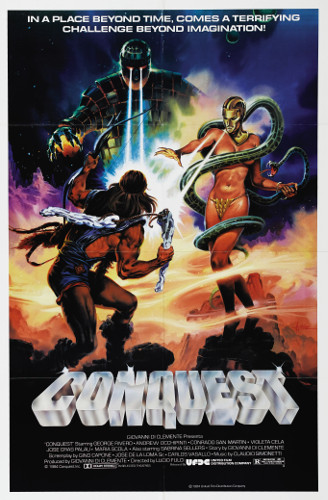
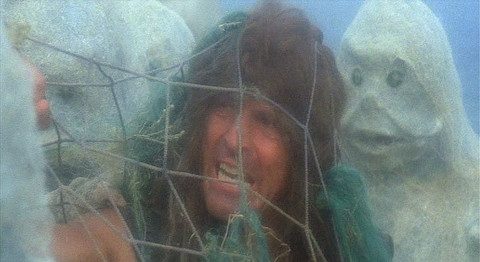
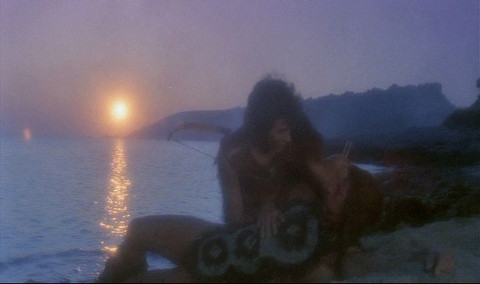





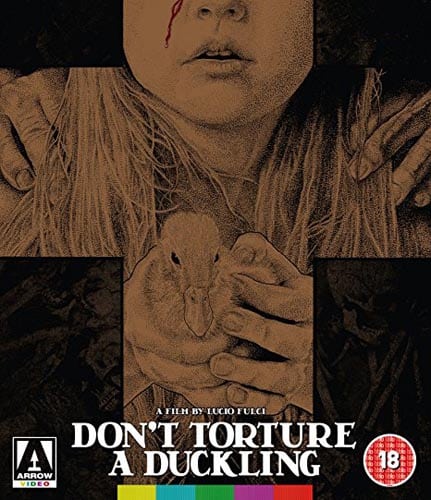
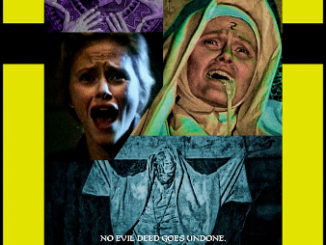
Be the first to comment